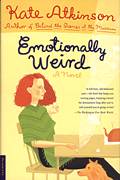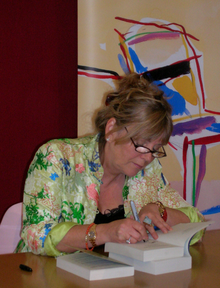 We now return to one of my favorite authors. I haven’t visited Kate Atkinson since her splendid Life After Life. She still holds the Writer Working trophy for the most inventive title—Left Early, Took My Dog.
We now return to one of my favorite authors. I haven’t visited Kate Atkinson since her splendid Life After Life. She still holds the Writer Working trophy for the most inventive title—Left Early, Took My Dog.
Although she’s always been a supremely inventive storyteller, she entered new territory with Life After Life, a work which borders on fantasy/science fiction in that the characters seem to exist simultaneously in different time and space, sort of like Virginia Woolf’s Orlando. Though not quite.
The main attraction of Emotionally Weird is that it’s funny, which is rare for novels that bill themselves as “comic,” and there’s far too little of humor on the market. Two other reasons, though: First, it is post-modern to the point of satirizing a genre that shouldn’t even be labeled. However stopping critics from categorizing would be like stopping the wind from blowing. I love it when the MFA industry gets a healthy jab in the ribs, and Atkinson’s stiletto is deadly in her portrayal of pretentious literary professors and their pontificating. I suppose this limits the audience for the book, since a someone who hasn’t spent some time with the lit crowd wouldn’t get some of the humor. But, hey, this is my review, and I have spent hours and hours with these people, and I laughed and laughed. Even at the way she plays with adverbs, which are supposedly verboten in modern prose, but which Effie uses shamelessly. She sometimes even searches for the right adverb. Second, we get three (maybe four) novels for the price on one. My notion of “post-modernism” is a novel about someone writing a novel. I know there’s a lot more to it than that, but I don’t care much for all theorizing, so I’ll stick with that oversimplified notion. And here, briefly, are the novels:
- The (somewhat unreliable) narrator, Effie, (short for Euphemia, which my google search tells me means “well-spoken,” which Effie is sometimes, but often not.) tells the story of her life to age twenty-one in the guise of writing a novel which she is reading aloud to her “mother,” who interjects criticisms as she goes. Effie often makes literary changes in response to the criticism. Often doesn’t 2. Effie writes a detective novel as a creative writing assignment for a university course. 3. Effie’s “mother,” with much prodding, tells the story of her own life, much of which she’s concealed from Effie lo, these many years. 4. Dogs appear from time to time and are so essential to the tale(s) that it could be their stories are a novel in themselves.

Juggling all these tales mysterious and frustrating because it seems occasionally as if the story has stalled and is just a list of events without a through-line. Wrong. Note that “mother” is in quotes here. There’s a mystery about that whose solution I won’t spoil by exposing it here. By the end, every single thread of every novel is woven into a tapestry whose pattern is not discernible till it’s realized in the denouement.
Then there’s a Dickensian afterword which explains in detail what happens to the main characters into the future.
It’s wonderful to watch Atkinson grow and prosper and develop her art, refusing to rest on what’s gone before—a series of excellent detective novels—and to plow new furrows. Go, Kate, go.
